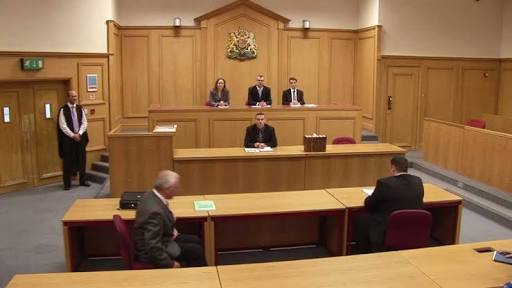And then i was sued
.jpeg)
It was a cold winter afternoon on Thursday, January 31st, 2013. I was busy working in the clinic when my receptionist told me a court bailiff was looking for me to sign some papers. I thought, certainly that must be some kind of mistake. But it wasn't. I had been sued and he was serving me the summons. Later I received a 5-inch thick packet prepared by the plaintiff's lawyers with more than 100 interrogatories for my response. My world came crashing down on me. For the next 5 years, this story gradually played out and I have lived with this heavy weight on my shoulders. This is a personal story and I feel a few of you may take one or two things away from it, especially those practicing outside of Nigeria.
The Case:
A brief summary of the case: I finished my Pediatrics residency in June, 2010 and started work with a rural hospital in West Memphis, AR in September, 2010, a hospital that has since filed bankruptcy and closed since 2014. One fateful night, exactly the night of February 2nd, 2011, I was deep asleep when I was awoken around 11 PM by a phone call from the hospital. I was on call. The nurses told me a baby had just been delivered vaginally with apparently no initial problems but few minutes later, they started noticing that the baby's color was dusky to gray....in essence becoming cyanotic. They gave some oxygen via nasal cannula with no improvement. They tried placing the baby in oxy-hood with still no improvement. I knew I was dealing with an emergency. I told them to start PPV and that I will quickly rush to the hospital. I got to the hospital quickly and examined the baby briefly. He was not in distress, he was breathing well; the only problem was his color: he was cyanotic. I briefly got a quick pre-natal and labor and delivery history from the OB and only significant thing was mom had GDM and delivery was via VBAC (Vaginal delivery after C-section) and baby was LGA. Nothing in that history was suggestive of why the baby was having this problem. We worked on this baby frantically and tried to secure an IV access but could not get one (we tried umbilical, peripheral IVs and even intra-osseus). In the midst of all this, the baby coded (his HR went below 60), I called a code and started chest compressions. An ER doctor came to help (hospital was poorly staffed at the time). I intubated the baby but we did not have a ventilator so kept on bagging the baby through an ET tube. Despite all these interventions, baby's oxygen saturations never went above 70%. After the code and his HR went up above 120's, I quickly called for transfer to a tertiary hospital in Memphis. Unfortunately it took them 45 minutes to arrive (usually it takes them <15 minutes to come). At the time, my differentials were that this baby had a congenital cardiac problem or maybe PPHN (Primary persistent pulmonary hypertension). To summarize, the baby was transferred to the tertiary hospital and unfortunately eventually died there the next day. It was instructive that not even the transport team could get an IV access on this baby and had to transport him without an access, something extremely unusual. Even at the Children's hospital in Memphis, it took them more than an hour to get an umbilical access.
Later on, from autopsy, we would find that this baby indeed had a severe form on PPHN.
2 Years Later:
I got sued almost 2 years later after this event. I had to go back to look at my chart to remember this case but it was easy to remember b/c this case traumatized me. I experienced intense emotions in the initial weeks after I was notified of the lawsuit. In the US, there is always a risk of medical malpractice lawsuit, but it's often much higher for procedure-based specialties like OB, Surgery, Orthopedics etc. Theoretically, Pediatrics is one of the specialties with the lowest risk of lawsuits and a lot of pediatricians can potentially go through their professional life for over 40 years without a single lawsuit. But I was sued. I went through the 5 stages of grief:
Denial: This cannot be true. Maybe there was some error somewhere. Surely, they will drop this case against me at some point
.jpeg)
Anger: How could they do this to me? After all my efforts? This baby did not even die in my hospital (Later I realized that the tertiary hospital was initially sued; then later they dropped them and sued me, the OB and my hospital. With time, they dropped the OB and it was just me and my hospital. A month before my case went to trial, the insurance company for the hospital settled for half a million dollars so I was the last man standing)
Bargaining: I started bargaining with myself. Maybe after the interrogatories, we can bargain with the plaintiff and they will let me off the hook
Depression: For the first few weeks, I was depressed about this b/c I felt helpless. I was also afraid b/c I felt I could become bankrupt from this case if I lost. Why? B/c my lawyer, provided to me by my Malpractice insurance company told me that I was only insured for $1 million and if the plaintiffs won the case and they jury awarded them more than $1 million, I will be on the hook for the difference
Acceptance: I eventually accepted my fate. However, despite my positive spirits and the fact that I always try to motivate myself, I struggled with cycles of depression for the next 5 years that this case lasted.
The Never Ending Lawsuit
This case then started to drag on. I started to learn all the processes involved with medical malpractice litigation. I had to educate myself. I did a CME specifically about medical malpractice lawsuits. There were tons of fact finding by both teams of lawyers. Medical records both at my hospital, records of my phone conversations with the tertiary hospital and their own medical records was meticulously reviewed by the lawyers. Unfortunately, my documentation as well as the nursing documentation on that day was very poor (who will be thinking of a lawsuit when you are dealing with an emergency and trying to save a life?)
There were several depositions (more than 15 including mostly the people involved that day with this baby). I had my own deposition in 2015. To prepare me for my deposition, my lawyer spent a combined total of about 20 hours preparing me for this. The actual deposition was 6 hours of hell. It was a grueling experience. The plaintiff's lawyer grilled me on the standard of care and why I did not follow it. It was a traumatic experience.
Months turned into years. At some point, the judge appointed to the case withdrew himself from the case b/c of conflict of interest (I was the pediatrician to his son while I was in this community). The new judge asked both lawyers to go to mediation to settle the case. Even though I wanted so bad for this case to end, my lawyer advised me not to settle b/c he felt we had a strong case. The other problem is that, when you settle, this is a judgement against you: It goes on your record, you have to notify the state medical board and it will be on your license and anyone can google your name and this will be on your record forever and sometimes patients will say they don't want to see you b/c you have had a malpractice case.
Fast forward a few more years, the case was eventually set to go on trial from February 12 - 16, 2018. My malpractice insurance company arranged to have an attorney from Harvard come to prepare me for trial. This lasted for about 6 hours. This lawyer told me how to dress, how to talk to the jury, how to tell my story. She told me that only 3% of malpractice cases go to trial b/c most doctors are weary of the process and prefer to settle, but of those ones that go to trial, 98% of them are discharged (the doctors win the cases). She told me that she has prepared 420 doctors around the country for trial in the past decade and all 420 of them won their cases, including one Igbo boy she prepared in Boston, MA last year. This was reassuring but still there are no guarantees.
.jpeg)
The Trail
This past week, I have been in court all day from 9-5 PM from Monday until yesterday. This has been the most grueling experience of my life. The whole process has been intense, from the selection of 12 jurors from a list of 80 potential jurors (this process is called voir doire), to the opening statements, to the witnesses, expert witnesses, some video depositions, tendering of exhibits and closing statements. The plaintiff's lawyers got two Harvard doctors as expert witnesses (one Neonatologist and one Pathologist) who testified against me and offered damning opinions against my care of this baby. These experts charged $750 an hour for reviewing the records and testifying in court. My lawyer did a great job in cross examining them.The plaintiff's lawyers were vicious when I took the stand and tried to tear me apart, but my lawyer prepared me well enough and I practiced the art of the pivot. These lawyers maligned my name, insulted me, misrepresented what I did and even flat out lied about what I did. It was horrible. I felt like slapping these two lawyers. I wondered how they slept at night peacefully after destroying one's character like this. I also felt the whole case was too complex for the jury to fully understand b/c they were showing them pictures/graphics of fetal circulation, PPHN, pathology slides and there were heavy use of complex medical terms that most of them had no idea what it meant (these jurors are everyday common people like Pre-school teachers, retirees, truck drivers). The plaintiff's lawyers put the family on stand (both parents and the 13 year old brother of the dead baby) and of course they cried during their testimony: this was so as to appeal to the sympathy factor of the jurors.
We gave it our best shot. Our only expert witness, a Neonatologist from Arkansas who has practiced for 45 years, defended me and stated that I did nothing wrong. But he fell apart on cross examination (lawyers are extremely smart and can tear apart anybody on cross examination, no matter how smart you are). By Thursday night, we had finished with all the witnesses. My lawyer told me he has tried his best and that this case could go either way.
As noted earlier, the defunct hospital had settled last month for $500,000. On their closing arguments, the plaintiffs asked the jurors to award them $4 million dollars. This would mean that if they won the case and the jury awarded them that much, I will be on the hook for $3 million.....essentially guaranteeing I will be bankrupt for the rest of my life! My heart was filled with trepidation. The judge gave the jurors their instructions and told them to go do their deliberations. There were 12 jurors and to decide for either party, 9 or more jurors had to be in agreement. If only 8 jurors are in agreement, the case will be considered a mistrial and this whole process will start again on a future date. But I was so ready to be done.
Redemption at Last:
Typically, the jurors take a few hours to do their deliberations. Yesterday, in my case, it took them only 7 minutes and their verdict was unanimous in my favor. RELIEF at last!!! I felt good like I've never felt in the last 5 years. I slept with both eyes closed for the first time in 5 years. It is all over.
Lessons Learned:
After this whole process, I've learnt a few lessons which I'd like to pass on
Documentation is important: Since being sued, I now practice defensive medicine (I'm sorry but if you've never been sued, you will never understand). I could have lost this case b/c of my poor documentation. The plaintiffs argued that they cannot rely on my memory since this happened many years ago but they will only rely on my charting and records. Thank God the jury believed my testimony and that of my nurses. These days, my notes are extremely detailed and with every patient I see, I am thinking ahead of a possible lawsuit and I protect myself with defensive documentation......no apologies for that
Importance of Asset Protection: If you have the letters MD behind your name, you have a target on your back. Know which of your assets can be protected and which can be confiscated. I don't have much in assets but virtually all the little I have are in retirement accounts which are protected from creditors in case of a lawsuit. It does not make sense for any doctor to invest in taxable accounts or real estate if you have not maxed out all the available retirement accounts available to you
Carry Umbrella Insurance: This would not have protected me in this case but the target on a doctor's back in this country is ever present (the US is the most litigious country in the world) but umbrella insurance can protect you from lawsuits related to your home and auto. This is also one of the cheapest insurance in the market place. An umbrella insurance for $1-3 million of coverage will cost an annual premium of <$300
Always be courteous and nice to work colleagues: This is just my personality but it paid dividends in this case. Two of the transport team staff from the tertiary staff that came to pick up this baby testified in their deposition that they never saw me in the Nursery when they came (a bold-faced lie). In fact one of them actually said, she only remembers seeing a Caucasian doctor and not me. However two of the nurses that actually worked with me (all Caucasians) gave a strong testimony that I responded appropriately and that I never left the baby's bedside as we worked hard to save his life. I just kept wondering what they would have said if they didn't like me or I didn't have a good working relationship with me. If they had dared to testify against me, I would have lost this case. And I've seen where this happens (one of my OB colleagues had his own nurse testify against him in court!)
The System works in America: Even though this was traumatic, the judicial system really works in this country, even for a foreigner like me. The Jurors, who were mostly White people gave me a fair hearing. Most of them talked to me after the verdict and told me how angry they were at the plaintiff's lawyers for maligning me. The foreman (the lead juror who hands the verdict to the judge) told me that she specifically told one of the plaintiff's lawyers (from Morgan & Morgan) that he is scum and a nasty person. Most of the jurors were even more angry than I was and they told me they saw through the whole charade of this trial. This was quite reassuring. This case was all about money: this is how lawyers make money in this country
Having a god lawyer makes all the difference: My lawyer is one of the best defense lawyers in the state of Arkansas. Great lawyers don't come cheap though. It's probably cost my malpractice insurance company over $200,000 in the last 5 years to prosecute this case. It just makes you understand why many African Americans (mostly from poor families) go to prison in this country, often for minor offences. It's because they don't have the money to hire good lawyers to defend them. This is quite sad but that's the reality.
.jpeg)
This is a story I have been waiting to tell for a while but I was unable to discuss it while the lawsuit was still ongoing. It was a rotten experience that has left me rather jaded and it is an ordeal that has reinforced in me the pitfalls of practicing in a developed country and the importance of shooting for financial independence as early as possible so one can have options of leaving the medical profession if one so desires.
I hope you got something out of it. Thanks for reading.
..Debt . dangerous...simple is beautiful!!!